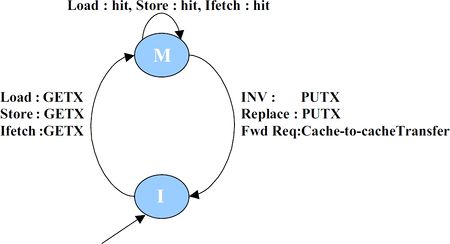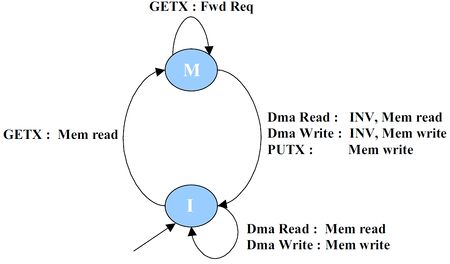Difference between revisions of "MI example"
From gem5
Nilayvaish (talk | contribs) (Added a separate page on MI example coherence protocol.) |
Nilayvaish (talk | contribs) (Removed the repeated heading) |
||
| Line 1: | Line 1: | ||
| − | |||
| − | |||
=== Protocol Overview === | === Protocol Overview === | ||
Latest revision as of 23:16, 8 July 2013
Contents
Protocol Overview
- This is a simple cache coherence protocol that is used to illustrate protocol specification using SLICC.
- This protocol assumes a 1-level cache hierarchy. The cache is private to each node. The caches are kept coherent by a directory controller. Since the hierarchy is only 1-level, there is no inclusion/exclusion requirement.
- This protocol does not differentiate between loads and stores.
- This protocol cannot implement the semantics of LL/SC instructions, because external GETS requests that hit a block within a LL/SC sequence steal exclusive permissions, thus causing the SC instruction to fail.
Related Files
- src/mem/protocols
- MI_example-cache.sm: cache controller specification
- MI_example-dir.sm: directory controller specification
- MI_example-dma.sm: dma controller specification
- MI_example-msg.sm: message type specification
- MI_example.slicc: container file
Stable States and Invariants
| States | Invariants |
|---|---|
| M | The cache block has been accessed (read/written) by this node. No other node holds a copy of the cache block |
| I | The cache block at this node is invalid |
The notation used in the controller FSM diagrams is described here.
Cache controller
- Requests, Responses, Triggers:
- Load, Instruction fetch, Store from the core
- Replacement from self
- Data from the directory controller
- Forwarded request (intervention) from the directory controller
- Writeback acknowledgement from the directory controller
- Invalidations from directory controller (on dma activity)
- Main Operation:
- On a load/Instruction fetch/Store request from the core:
- it checks whether the corresponding block is present in the M state. If so, it returns a hit
- otherwise, if in I state, it initiates a GETX request from the directory controller
- On a load/Instruction fetch/Store request from the core:
- On a replacement trigger from self:
- it evicts the block, issues a writeback request to the directory controller
- it waits for acknowledgement from the directory controller (to prevent races)
- On a replacement trigger from self:
- On a forwarded request from the directory controller:
- This means that the block was in M state at this node when the request was generated by some other node
- It sends the block directly to the requesting node (cache-to-cache transfer)
- It evicts the block from this node
- On a forwarded request from the directory controller:
- Invalidations are similar to replacements
Directory controller
- Requests, Responses, Triggers:
- GETX from the cores, Forwarded GETX to the cores
- Data from memory, Data to the cores
- Writeback requests from the cores, Writeback acknowledgements to the cores
- DMA read, write requests from the DMA controllers
- Main Operation:
- The directory maintains track of which core has a block in the M state. It designates this core as owner of the block.
- On a GETX request from a core:
- If the block is not present, a memory fetch request is initiated
- If the block is already present, then it means the request is generated from some other core
- In this case, a forwarded request is sent to the original owner
- Ownership of the block is transferred to the requestor
- On a writeback request from a core:
- If the core is owner, the data is written to memory and acknowledgement is sent back to the core
- If the core is not owner, a NACK is sent back
- This can happen in a race condition
- The core evicted the block while a forwarded request some other core was on the way and the directory has already changed ownership for the core
- The evicting core holds the data till the forwarded request arrives
- On DMA accesses (read/write)
- Invalidation is sent to the owner node (if any). Otherwise data is fetched from memory.
- This ensures that the most recent data is available.
Other features
- MI protocols don't support LL/SC semantics. A load from a remote core will invalidate the cache block.
- This protocol has no timeout mechanisms.

